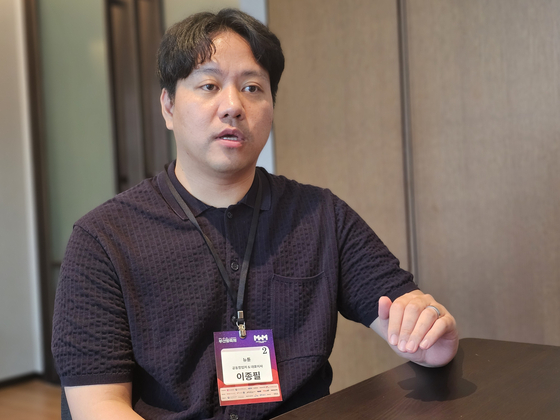Our Terms & Conditions | Our Privacy Policy
Neutune’s MixAudio aims to be ChatGPT for music
Neutune CEO and co-founder Lee Jong-pil speaks to the Korea JoongAng Daily the 2025 MWM Conference in Busan on May 30. [SHIN HA-NEE]
BUSAN — The initial shock when artificial intelligence first began to compose a full song — once considered an epitome of human creativity — with just a push of a button, has begun to wear off.
Now, a new reality has settled in, where AI music generation startups are facing a complex web of real-world legal challenges regarding the use of copyrighted works to train their models.
But one Korean company appears to be navigating the copyright minefield with relative ease. The 2020-founded Neutune, the country’s first multimodal AI music generation startup, aims to become what CEO and co-founder Lee Jong-pil describes as a full-fledged “AI music agent,” akin to the musical version of OpenAI’s ChatGPT, with a vision to transform not only music’s creation, but also its distribution.
Neutune’s flagship AI music generation service, MixAudio, “is not just about an AI model that simply provides a finished product,” Lee told the Korea JoongAng Daily at the 2025 Moving the World with Music (MWM) Conference, hosted by the Korean Music Association, in Busan on Friday. “It’s about having a massive inventory of musical pieces that the system can connect, break down, adapt and generate from, which, therefore, can track what fragments were used and who contributed to the final output.”
MixAudio, launched in 2023, creates instrumental tracks based on users’ prompts. You can query using not only text — “Create a lo-fi hip-hop song to help me focus while working” — but also images.

Background music appears as if out of thin air — but in reality, what the service does is less conjuring and more building, piece by piece.
“As music is fundamentally mathematical in its composition, it can be assembled together just like Lego blocks,” explained Lee.
At the heart of MixAudio is a library of about 300,000 sound blocks — each at least eight measures long and composed by human musicians — that can be arranged and modified to create new songs. Using its tracking feature, MixAudio ensures that musicians who create the original sound blocks are compensated when their work is used.
“Our goal is not just about providing a [generative] service, but rather to have a new distribution system,” said Lee, reflecting on the core vision he and his six co-founders shared when they first launched the startup.
“In this rapidly changing world, we all agreed on this fundamental idea that music should be distributed in smaller, modular units,” he explained, suggesting this could lead to an “explosive expansion” of the musical landscape.
Lee views MixAudio’s business models in three categories: a productivity tool for musicians, a background music generator similar to a radio station and a remix platform where users can creatively mix the work of artists who have signed a license agreement with Neutune.
![Neutune's MixAudio [SCREEN CAPTURE]](https://pune.media/wp-content/uploads/2025/06/9540aab6-0ec2-46e5-a2c5-a5247923a0c8.jpg)
Neutune’s MixAudio [SCREEN CAPTURE]
Among Neutune’s target audience are video creators. Upload a video to MixAudio, and the algorithm will analyze each segment and generate music tailored accordingly.
Another promising market is in-store music, particularly in countries like Thailand where copyright tracking is strict. Neutune is currently in discussion with potential partners in the region, according to Lee.
Neutune plans to upgrade MixAudio into a fully fledged music agent starting in June. The updated version will enable users to make additional requests via text, such as for the editing, analysis and adjustment of AI-generated music and its export it to mixing software.
The modular nature of MixAudio, powered by multiple specialized AI models, will allow it to easily expand into a more versatile AI agent, Lee said.
“We will reach an era where a truly personalized, hyper-customized musical experience becomes possible through AI,” said the CEO, a process in which he hopes Neutune will be a “major player.”
![Korea Music Content Association (KMCA) hosted the 2025 MWM Conference at the Busan Port in the southeastern coastal city on May 30, which ran alongside the 18th Busan Port Festival with MyK Festa. [KMCA]](https://pune.media/wp-content/uploads/2025/06/ca7d06fb-905f-4099-9a13-89ae3ea13ae4.jpg)
Korea Music Content Association (KMCA) hosted the 2025 MWM Conference at the Busan Port in the southeastern coastal city on May 30, which ran alongside the 18th Busan Port Festival with MyK Festa. [KMCA]
Lee, who took to stage at the 2025 MWM Conference as a presenter, noted that the industry appears to be embracing AI rather than viewing it as a threat.
“What I noticed during the conference was that the industry certainly does not consider AI an enemy,” he said. “It felt like they are open to finding a new path together, to come up with solutions.”
BY SHIN HA-NEE [[email protected]]
Images are for reference only.Images and contents gathered automatic from google or 3rd party sources.All rights on the images and contents are with their legal original owners.



Comments are closed.